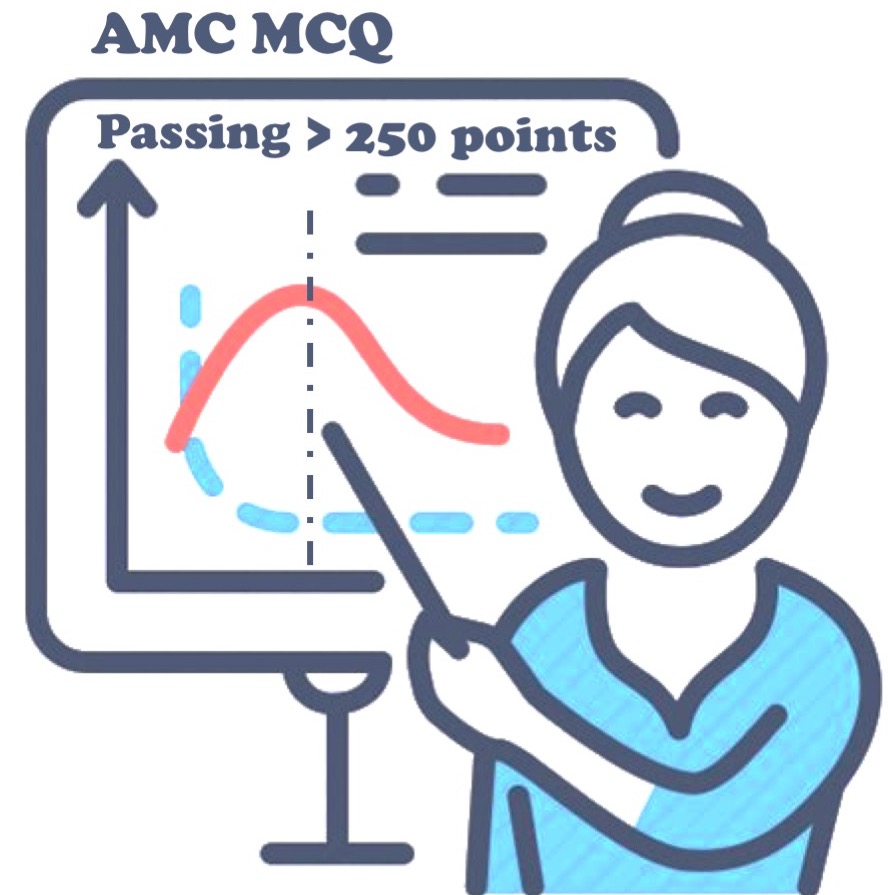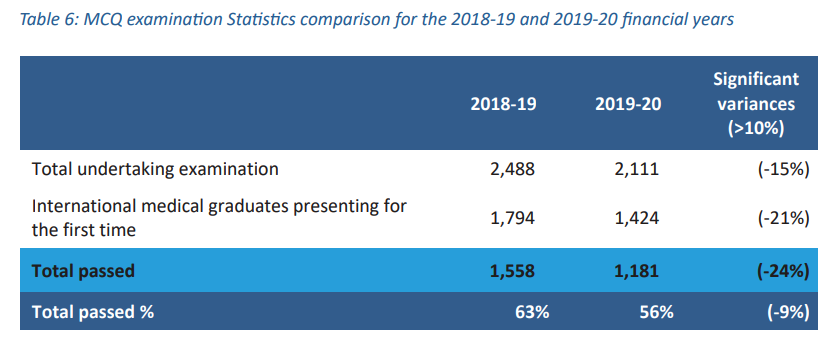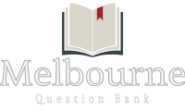About Us
“It is better to aim high and miss than to aim low and hit.” – Les Brown
What We're All About
Our main goal is to see our trainees successfully passing their exams on their first attempt with the highest score possible. We thrive on success, and we want to see you succeed.
Melbourne-Q bank is more than a question bank, this is a comprehensive medical training resource.
By using this question bank you will be exposed to every single item asked in the AMC examination. We have questions covering every subject and every question type presented in the exam, from the basic biological fact question type to the trickiest ones that will test your ability to solve complicated clinical scenarios. Furthermore, we elaborate recall-inspired multiple-choice questions using the latest recalls that keep us updated with the current structure of the AMC exam. Finally, one aspect that distinguishes us from the rest of the question banks is that we are all doctors with training in medical education who follow the latest updates of Australian guidelines in every question we make.
Our purpose
We are here to help you to develop the skills required to bridge the gap between empirical knowledge and standardized multiple-choice exams.

The way medicine is taught and practiced differs from the way is tested in multiple-choice exams, and not all multiple-choice exams have the same structure.
Standardized tests are the simplest way to assess the students’ knowledge. However, the creation of multiple-choice questions usually requires an abstract scenario that is loaded with dissuasive signs with little hints towards the correct diagnosis.
The Australian Medical Council has its own way of writing questions. The AMC MCQ is a Computer Adaptive Test (CAT) with 150 questions that differs in structure and length from the American equivalent (USMLE). The USMLE is larger (318 questions) and these question type presents a more comprehensive vignette, including distractors but also negative findings allowing you to rule out differentials. The AMC MCQ tend to provide less information, and due to its unique nature “computer adaptive test” requires only 120 multiple choice questions to assess the candidate’s performance. Therefore, the AMC MCQ exam requires a specific study preparation.
This is not a reading contest…
It does not matter if you can memorize and recite Murtagh’s General Practice if you cannot answer questions. Tests are meant to filter and classify individuals. When you read your textbook the information is presented in a straightforward fashion so, it can be fully understood. This is not the case for multiple-choice exams. The AMC MCQ exam assesses your knowledge with clinical scenarios that provide limited information, includes dissuasive signs (distractors) and all the options seem to be correct. Unfortunately, neither the real practice of medicine nor the textbook prepares you for this challenge. Hence, this highlights the importance of question banks.
The exam includes 150 questions in total. However, only 120 will be scored questions (500 points). These questions are divided by category:
- Adult Health Medicine (35)
- Surgery (25)
- Women’s Health: Obstetrics + Gynecology (15)
- Child Health: Paediatrics + Neonatology (15)
- Mental health: Psychiatry + Psychology (15)
- Population Health (15).
The 120 scored questions are mixed with 30 extra questions that serve as a test of the exam itself and for future exams. Therefore, you have to answer them all as if they would determine your final score. Population Health is a bit of a confusing term. They seem to put public health, statistics, and ethics all together in this category.
In order To PASS, you have to beat the mean (250 points).
In addition to being able to solve clinical cases made of a mix of truths and misguiding facts, you have to beat half of your colleagues (on average). Your passing score may be affected by the performance of the rest of the test-takers in the same month you took the exam. The 50% percent is determined by Gaussian distribution. Therefore, you want to be at top of the game. Melbourne-Q bank was created specifically to crush this exam, we make high-yield questions and recall-inspired questions that resemble how the clinical scenarios are presented in the AMC exam.

About you:
We want to you to know what challenges you may encounter in your exam and during the preparation.

You only have 84 seconds per question to solve complex case scenarios.
Melbourne-Q bank provides time-based questions that are such a critical and imperative part of the preparation for this exam. Time-based questions train you in the game of skimming for clues that will lead you to the right answer. Neither textbooks nor courses prepare you for this, this is a skill you must develop by using a question bank.
In order to optimise your time, our AMC program is designed to allow you to learn test-taking skills while you are learning how medicine is practiced in Australia. Melbourne-Q bank will guide you in identifying what the core topics are, and help you to “decode the language” used in the AMC MCQ exam.
We strongly suggest you start practicing with a question bank as soon as possible.

According to the AMC 2020 Annual report, only 56% of the students passed the AMC MCQ examination in the first attempt in 2019-2020.
Does this mean international graduates are less prepared than Australian graduates?
There is no evidence to back up that claim. Australian medical students are not required to take the AMC standardized tests toward obtaining a medical license. Therefore, there is no control group or baseline to be compared against IMG performance. They never compete in the same test against internationals. Furthermore, the Australian Medical Schools never test against each other on the same standarised test. In other words, nobody knows how much an Australian graduate would score on these standardized tests. Therefore, we cannot conclude that internationals are less prepared than Australians.
What other recognizable reasons can explain that roughly half of the candidates fail this exam?
Among the remaining factors that could explain this high failure rate, there are two well-known elements to be considered. First of all, the exam content is quite comprehensive, therefore, you need time to go through the studying material. The lack of time dedication carries an important risk for knowledge retention and is one of the most common factors involved in failure. In addition to that, studying in the wrong direction leads to poor outcomes. Although studying too much from textbooks and putting a lot of emphasis in details will make you knowledgeable, this does not means will make you a good test taker.
What can be done to improve the performance of International Medical Doctors?
The most important thing is to understand what the preparation for a standardised AMC examination entails. Not understanding this may end up costing you money, time, and frustration. Think of this, it is complete useless to have a high-end car if you don't know where to go, and you don't have a map.

We believe that the key to a successful score lies beneath two basic questions.
- What studying resources must be mastered? and
- For how long one should practice?
The answers to these questions are very simple.
- You are studying for a 150 multiple-choice question exam. Then, you must prepare yourself to answer multiple-choice questions that resemble the exam in length and difficulty. While textbooks and private courses may provide you with a good background is not exactly what you will be facing during the exam. This is the equivalent of preparing for a 10km run marathon with a program that trains you in a 100 metre run. Yes, in both competitions you run (10 km and 100 m), but the physique, endurance, and training requirements are totally different.
- You have to beat the mean and score more than 50%. Then, you have to practice until you pass all the mock exams with a consistent 80%-to-90% minimum. Why this target with a 30-to-40% of margin?. There is something called “stress performance” where performers have reduced their normal performance due to high-stress levels (in this case it would be the pressure during the day of the exam). In addition to the impact of stress on your performance, you need to consider that you want to be on the happy side of the 50% Gaussian curve. Hence, you need a generous and safe margin to beat the mean and overcome the negative impact of the stress performance.
Despite these observations being quite obvious, most of the students tend to base their studies on expensive private courses or textbooks. Many times postponing the practice with question banks until last month before the exam just to realize that is impossible to finish it in one month. They take one mock exam realizing that their performance is barely passable. At this stage, the date of the exam cannot be changed and they take the exam just to fail for a few points. This is what we call Frustration Town.
The pathway many walked and regretted it…
step 1
You pay for the AMC portfolio is $ 500 AUD. →AMC fees and charges
In order to take the AMC MCQ, you need to create a portfolio with the AMC which costs $ 500 AUD, and upload the documentation required (once translated by a certified NAATI translator).

step 2
You pay for the AMC CAT MCQ examination authorisation fee is $ 2,720 AUD. →AMC fees and charges
After they have processed your portfolio application and you are allowed to book the exam the AMC will charge you $2,744.48 AUD (including credit card fee).

step 3
Bridging course – Since you have no experience with AMC MCQ, you decide that it is a good idea to take an AMC MCQ bridging course ($ 600-3,100)
These courses can go from $600 up to $ 3,100 AUD. If you have not studied for a while, these courses may be useful to get you back to the books. However, must be noticed that bridging courses imply passive learning. You are taking an MCQ exam, you need to train test-taking skills. So, do not rest assured you will pass the exam with only bridging courses.

step 4
Books of reference – You still need a book such as Murtagh’s General Practice ($ 200 AUD), or review books such as USMLE Step 2 CK Lecture Notes 2021 that can cost up to $ 400 AUD.
Books of reference are an important tool. This can be used to settle an argument when you find conflicting biography. However, from the strategic point of view, it is not wise to mainly base your studies on textbooks. The reason being is you may end up spending way too much time on irrelevant topics, reading every detail of each chapter, instead of getting used to the way questions are asked in MCQ exams.

You start getting worried …

After spending $ 7,000 AUD and months studying from courses and books, you realized that you have not practiced with high-yield multiple-choice questions, and tested your knowledge in an AMC MCQ simulation test.
…So, you need a question bank.

step 5
Saving in
the wrong place!
Since you have spent a significant amount of time and money, now you have the “brilliant” idea of saving money by cutting off your budget for questions banks.
You have spent a lot of money and time in reading books/taking courses. Therefore, you decide to save up some money in questions banks. You ask around for copies of questions banks and you get an old and dated copy obtained by dubious means. Then you realized that is missing parts and ended up paying for a question bank (1 month) before the exam. For the vast majority of you, only one month will not be enough.
Little practice with questions banks costs more than using them for 6 months. If you fail the exam due to little practice with MCQ exams you will be paying again the authorisation fee (another $2,720 AUD) and study all over again … just to save as little as $ 500 AUD.
A special set of skills and a specific training is required
The skills you need include skimming, time management, being familiar with the computer interface, learning the AMC MCQ vocabulary, know how to make an educated guess from multiple seemingly correct answers, and general medical knowledge. This set of skills and knowledge certainly cannot be obtained within a month of preparation, you need dedication and time to move knowledge from your short memory to long-lasting memory. Finally, remember this is a competition, you need to beat the mean. Therefore, a barely passing score on mocks exams will take you to no other place than Frustration Town. Please, allow yourself plenty of time to practice with multiple choice exams. If you have no practice before, our advice is aim for 6 months of question bank training.

